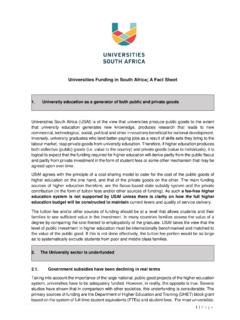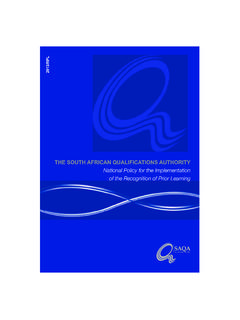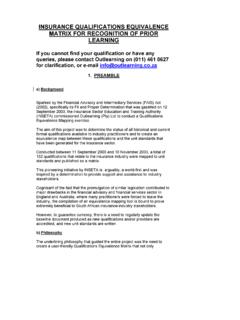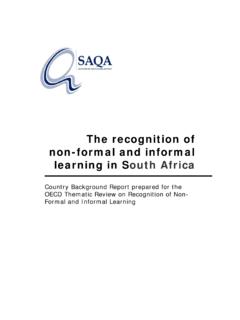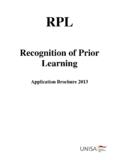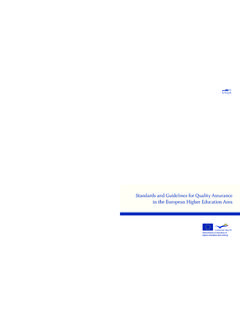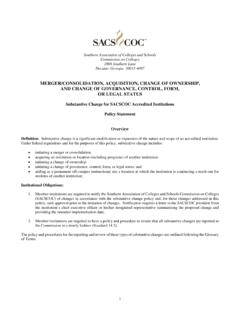Transcription of UNIVERSITY OF CAPE TOWN POLICY ON …
1 Approved: PC 09 2004 (Item 3) 1 UNIVERSITY OF CAPE TOWN POLICY ON recognition OF prior learning (RPL) * The document comprises three sections. Section A proposes a draft POLICY on recognition of prior learning Section B expands upon Section A and provides additional information on critical issues relating to RPL. The Appendix considers possibilities for implementation of RPL at UCT SECTION A: Preamble The National Plan Higher Education (2001) is based on the POLICY framework and the goals, values and principles that underpin that framework, outlined in the White Paper on Higher Education (1997). These are intended to develop a higher education system that will amongst other things: promote equity of access and fair chances of success to all who are seeking to realise their potential through higher education, while eradicating all forms of unfair discrimination and advancing redress for past inequalities ; (p7) The National Plan outlines the implementation framework for achieving the vision and goals of the White Paper.
2 In line with the White Paper, it established indicative targets for the size and shape of the higher education system, including overall growth and participation rates, institutional and programme mixes and equity and efficiency goals. The National Plan for Higher Education indicates that an important avenue for increasing the potential pool of recruits to higher education is to recruit non-traditional students workers, mature learners, in particular women, and the disabled. The provision of higher education to workers, mature learners and the disabled, aside from the equity and redress imperatives, would also play a significant role in addressing the shortage of high-level skills in the short to medium-term, especially as there is a large potential pool of recruits Increasing the access of workers, mature learners and the disabled to higher education is an important POLICY goal in its own right and should be approached as such.
3 (Ministry of Education, 2001, 28) Despite this recognition of the importance of increasing the numbers of mature learners in higher education, a recent report on Human Resource Development suggests that very little progress has been made across the system in this regard. In South Africa the further and higher education systems are characterised by a bias towards young, pre-employed students. Lifelong- learning opportunities for older, employed workers in colleges, technikons and universities are largely absent. Participation rates in the FET and HET sectors compare poorly with the participation rates for other countries. The South African post-school education and training system has not modernised and massified to the extent of other systems in the world, which have adapted significantly to the needs of adult and continuing education.
4 (Kraak, 2003, 18 19) * This draft POLICY document was formally approved by the Health Sciences Faculty Board, the Humanities Dean s Advisory Committee (DAC) on 27 July 2004, the Science Faculty s DAC on 20th August, and by a special CHED staff seminar on 23 August 2004. The Deans of Law and Engineering and Built Environment informed us that they had nOt received any major objections. There was a concern from the Dean of Law about the need to prioritise resource for student support to UCT s traditional students. Comment from the Commerce Faculty is still pending. Approved: PC 09 2004 (Item 3) 2 There is a commitment at UCT to redressing inequities and supporting lifelong learning through widening access to adult learners. This commitment is based on a belief that there are able people with valuable knowledge and experience in workplaces and communities who could benefit from UNIVERSITY study.
5 In fact UCT has admitted a number of students over time through making use of the discretionary power given to the Senate in terms of the Matriculation Board regulations to admit students who do not have matriculation endorsement. The exercise of this power has been devolved to faculties and each faculty may take advantage of this discretionary power to admit adults with potential to succeed on the basis of an assessment of their prior learning and experience. recognition of prior learning (hereafter RPL), in the form of various kinds of alternative access mechanisms, has therefore taken place in a number of programmes at UCT over a number of years, particularly at post-graduate level. However, an analysis of current practices at UCT reveals that there are no clear procedures for conducting an assessment of prior learning and experiences.
6 Much of RPL presently relies on the academic judgements of lecturers. This is likely to continue to be a dimension of RPL given the focus on making judgements about whether candidates prior learning and experience would enable them to succeed in an academic environment, rather than rigidly comparing performance against clearly defined standards. However UCT recognises that there is a need to make procedures more widely known and transparent, and to ensure more effective moderation of the assessment procedures and monitoring of student performance. Recently UCT s Council approved the establishment of a Centre for Open learning . UCT recognises that there are significant opportunities for expanding the use of RPL to enable access into post-graduate programmes, articulation from other types of learning pathways, and continuing professional development programmes or short courses.
7 The HEQC is also requiring institutions to provide evidence of an institutional RPL POLICY . To address the POLICY vacuum and to provide an enabling environment in which student access to UCT can be expanded through RPL, UCT has developed a comprehensive POLICY on RPL. 1. Definition In the UNIVERSITY context, the recognition of prior learning (RPL) is the evaluation and acknowledgement of the knowledge and skills that a candidate has gained other than through formal study to enable them to gain access to higher education even though they don t meet the normal entrance requirements. This includes knowledge gained as a result of non-formal study, paid and unpaid work experience, community and organisational involvement, and individual inquiry.
8 In the academic context, it is the acknowledgement that academically significant and socially useful knowledge is acquired through multiple formal, informal, and non-formal means. When evaluated through appropriate and reliable assessment practices, that knowledge can be used for purposes of academic access and accreditation. (For further information on varieties of RPL, and related epistemological issues which form part of the debate about RPL in higher education, see Section B). 2. Purposes of RPL In the UNIVERSITY context, the purpose of RPL is: To recognise and, where appropriate, grant advanced standing for the expertise gained by skilled individuals in non-academic contexts. To contribute to the holistic assessment and self-assessment of people entering onto a learning path.
9 The Centre for Open learning (CoL) is in the process of being established within CHED. Its purpose is to make the academic resources of the institution accessible to a wider range of participants, to enable the institution to become more socially responsive, to facilitate improved throughputs and student mobility, and to generate income for the UNIVERSITY . Approved: PC 09 2004 (Item 3) 3 To enrich the academy and the curriculum by facilitating dialogue across sites of knowledge and practice. To facilitate access to higher education and provide redress for historical inequities. To promote and facilitate lifelong learning . 3. Principles Governing RPL at UCT UCT is a broad institution with multiple forms and sites of academic practice.
10 RPL practices for specific programmes must be context-sensitive and framed to suit those differing contexts where RPL is deemed appropriate The evaluation of prior learning is an academic task and, like other forms of assessment, is done by academic experts in a given field, drawing on other experts as needed. Academics make the decision on whether to introduce an RPL access route into a particular programme of study. RPL is based on a developmental model, not a deficit model of adult learning ; it builds on knowledge and skills that adults have already acquired. RPL is part of UCT s broader commitment to be socially responsive to key social needs, and to significant constituencies in government and civil society.


